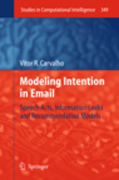
Modeling intention in email: speech acts, information leaks and recommendation models
Carvalho, Vitor R.
Everyday more than half of American adult internet users read or write email messages at least once. The prevalence of email has significantly impacted theworking world, functioning as a great asset on many levels, yet at times, a costly liability. In an effort to improve various aspects of work-related communication, this work applies sophisticated machine learning techniques to a large body of email data. Several effective models are proposed that can aid withthe prioritization of incoming messages, help with coordination of shared tasks, improve tracking of deadlines, and prevent disastrous information leaks. Carvalho presents many data-driven techniques that can positively impact work-related email communication and offers robust models that may be successfully applied to future machine learning tasks. Recent research on Modeling Intention in Email. Computational Intelligencemethods applied to Email. Written by a leading expert in the field. INDICE: Introduction. Email “Speech Acts”. Email Information Leaks. Recommending Email Recipients.- User Study. Conclusions.-Email Act Labeling Guidelines. User Study Supporting Material.
- ISBN: 978-3-642-19955-4
- Editorial: Springer Berlin Heidelberg
- Encuadernacion: Cartoné
- Páginas: 104
- Fecha Publicación: 15/04/2011
- Nº Volúmenes: 1
- Idioma: Inglés
